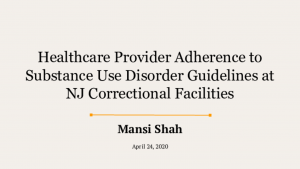Shah, Mansi: Healthcare Provider Adherence to Substance Use Disorder Guidelines at NJ Correctional Facilities
Title: Healthcare Provider Adherence to Substance Use Disorder Guidelines at NJ Correctional Facilities
Name: Mansi Shah
Major: Cell Biology and Neuroscience
School affiliation: Douglass Residential College, Honors College, School of Arts and Sciences
Programs: Honors College Capstone
Other contributors: Arthur Brewer, Lisa Debilio
Abstract: Substance use disorders have emerged as a national crisis in the United States. In 2016, the opioid overdose crisis, in particular, took the lives of 115 people in the US every day. In response to the many contributing factors in this epidemic, many health systems are finding ways to decrease the risk of relapse to prevent overdoses from occurring altogether. Vulnerable populations, including justice-involved individuals, have significantly higher rates of diagnoses of opioid use disorders.
In New Jersey, Rutgers University Correctional Health Care (UCHC) oversees healthcare for incarcerated individuals in jails and prisons. According to UCHC guidelines, 100% of patients with opioid use disorder should be both counseled and offered Medication-Assisted Treatment (MAT) within the last six months of their stay within New Jersey Department of Corrections (NJDOC). The goal of this interdisciplinary project is to conduct an internal review of adherence to reentry guidelines by healthcare providers at Rutgers UCHC. The project will review patient charts from a 6 month time period to determine whether MAT was appropriately prescribed to patients with substance use disorder. In addition, the project will compare the number of individuals who requested MAT to the number of individuals who were actually prescribed it. Pre-release MAT is administered to prevent the risk of relapse, and administration is intended to continue upon release from jail or prison. Project outcomes will help inform policy recommendations at UCHC to ensure that at-risk patients are connected with the appropriate resources prior to re-entering into the community.
